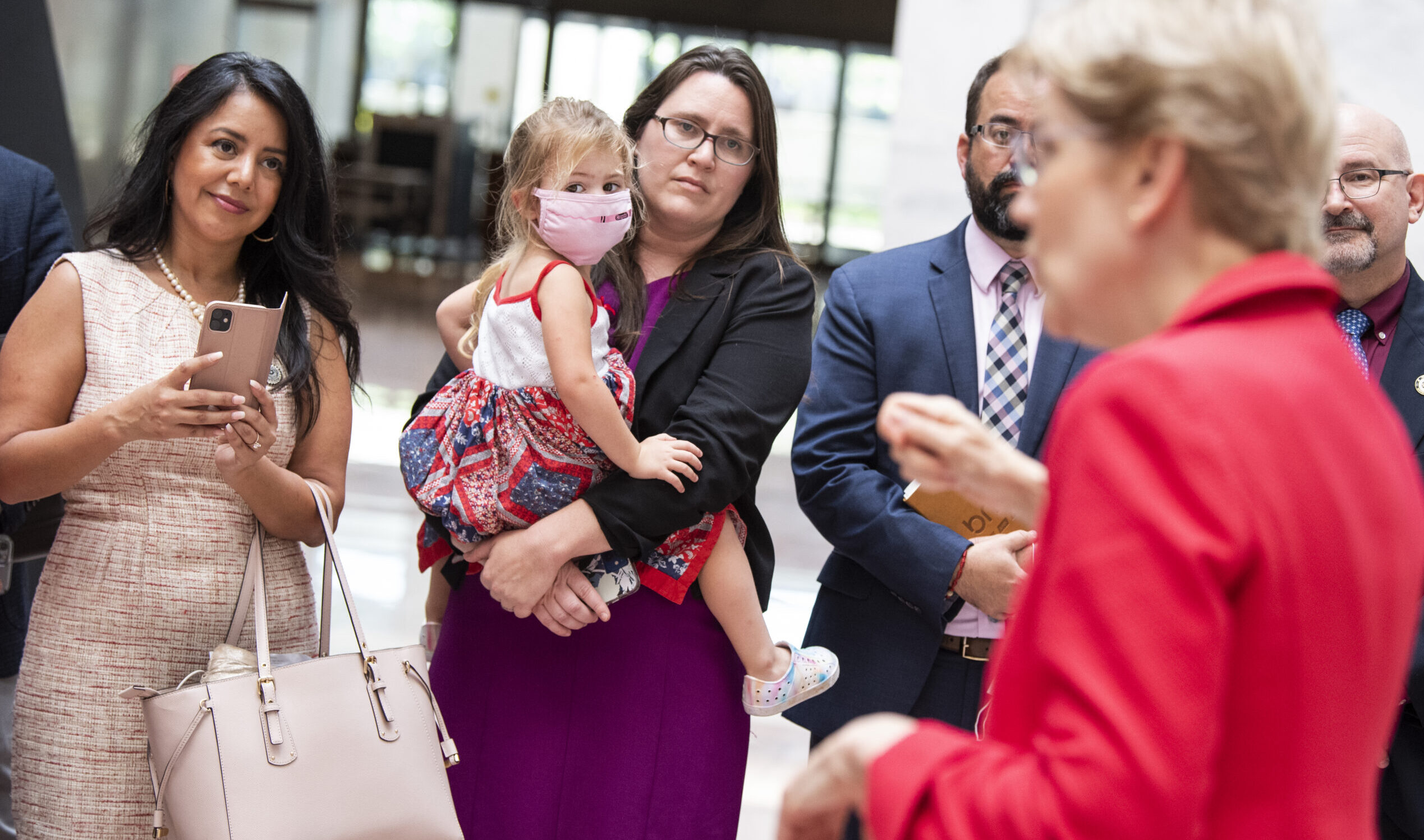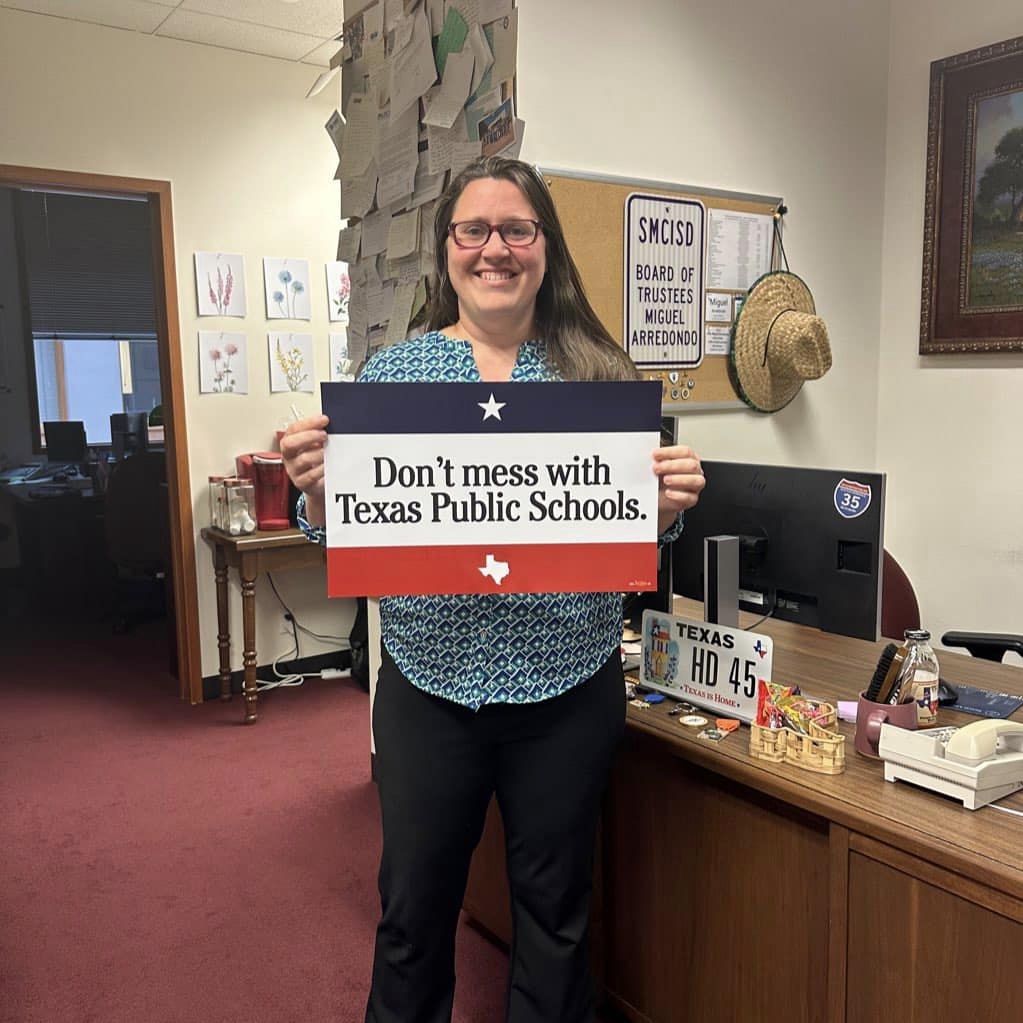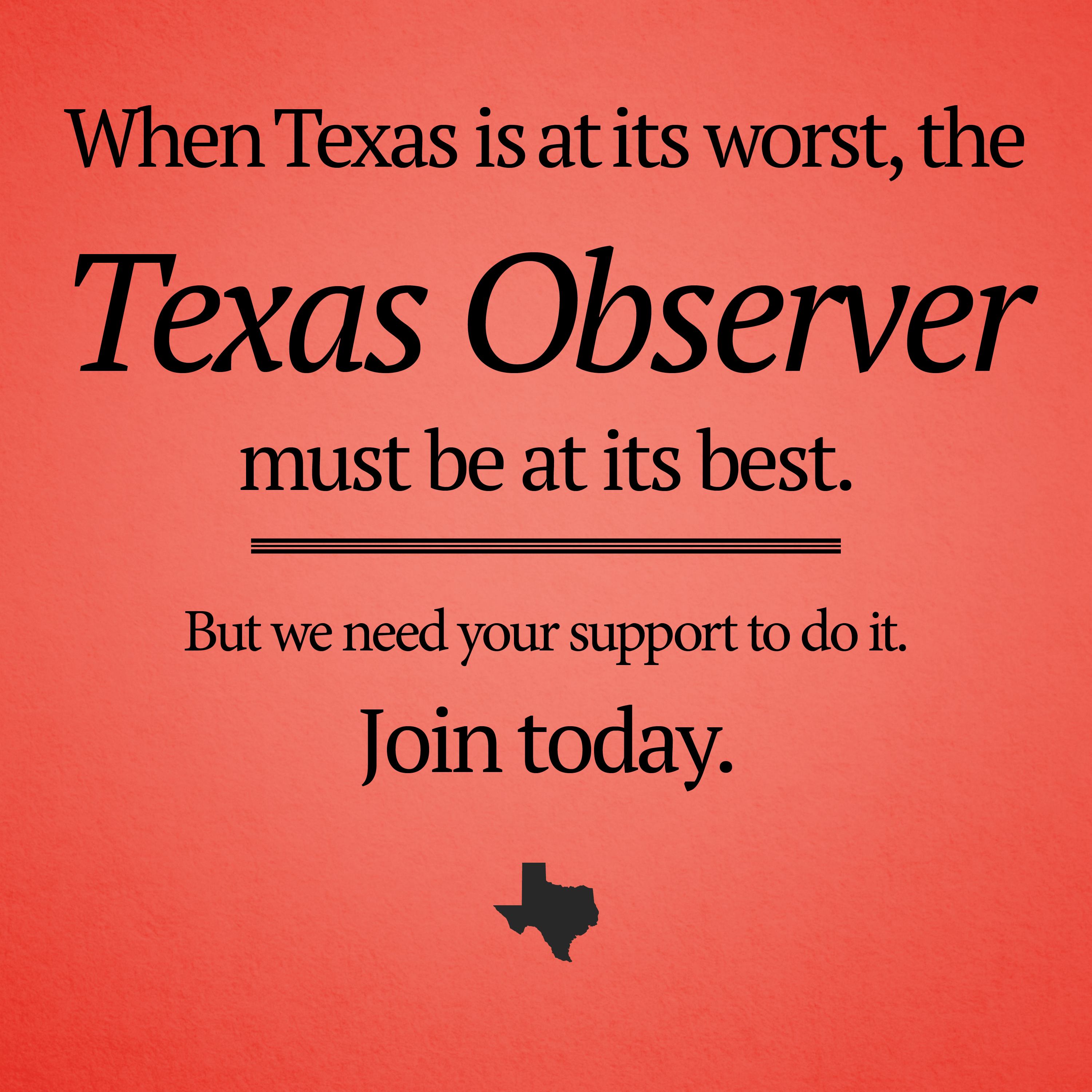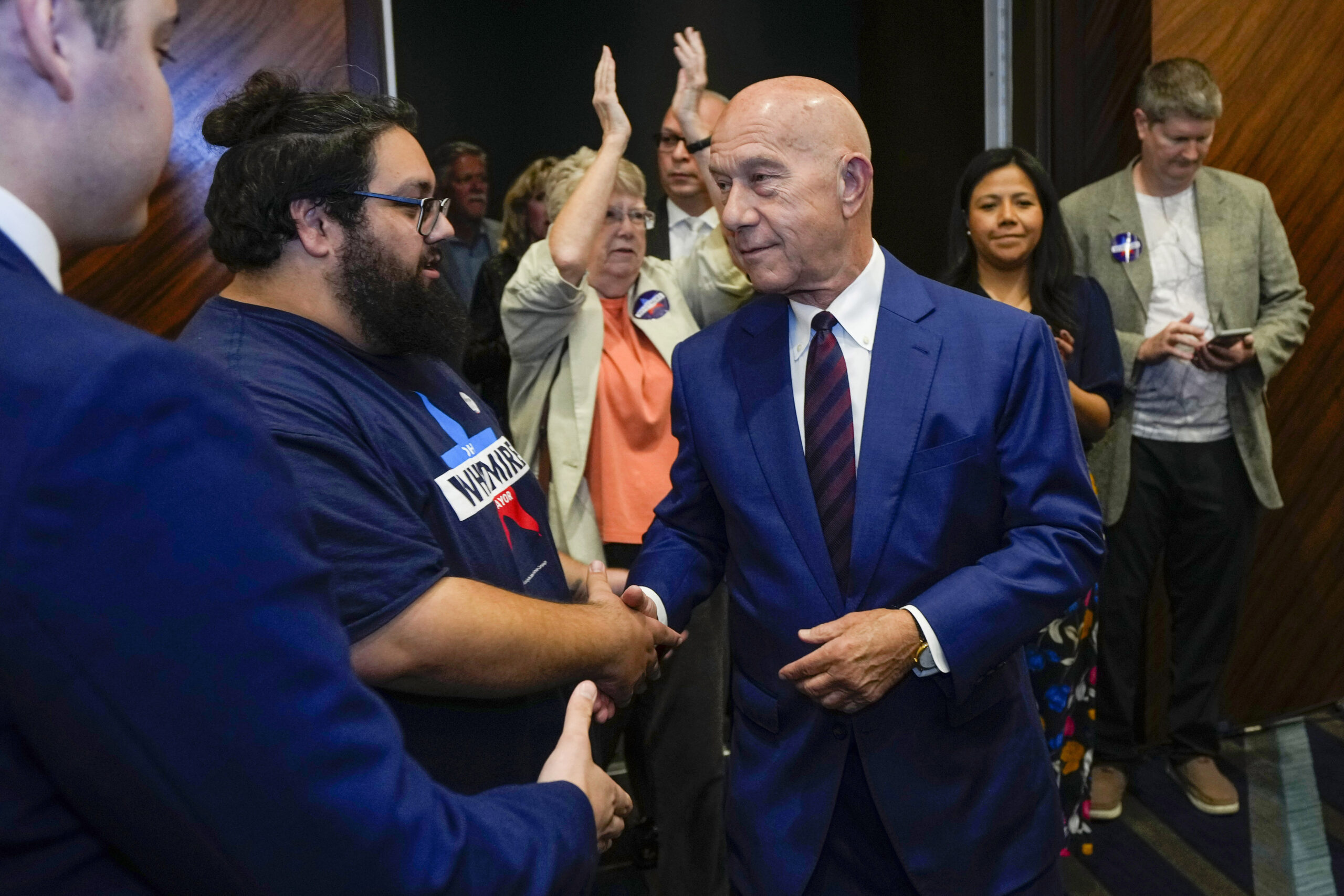
Texas Observer School Board Investigation Spurs Call for Reform
State Representative Erin Zwiener says Texas must improve campaign finance transparency and adopt contribution limits.

Above: State Representative Erin Zwiener, district 45, holds her daughter, Lark, 3, at a meeting between Senator Elizabeth Warren and Democratic members of the Texas Legislature.
In November, state Representative Erin Zwiener, a third-term Democratic legislator representing the 45th district of the state House of Representatives, issued a call for campaign finance reform in response to the part 1 of “The School Board Backers,” a Texas Observer series that reveals how a network of partisan PACs and consultants supported dozens of ultraconservative candidates that took over some Texas school boards and then forced hard-right policy turns.
The Texas Observer’s special investigative correspondent Steven Monacelli collected hundreds of reports, some of them handwritten, that he analyzed as part of that series, supported through a grant from the Fund for Investigative Journalism.
Monacelli recently spoke with Zwiener to learn more about why she thinks it is crucial for the state legislature to increase access to local campaign finance reports, especially in formerly nonpartisan school board races.
This interview has been edited for length and clarity.
You recently responded to the series we published about a network of consultants and PACs backing ultraconservative candidates for local school boards. Your post on X said: “We need to digitize local election finance reports and establish campaign contributions limits. Without them, our elections are for sale, and it takes an obscene amount of work to figure out who’s buying.” Why do you think that?
The school board issues are obviously at the forefront of everyone’s mind right now, because we’ve had more and more big-name PACs start to participate in those elections. Our school board races have gotten unnecessarily politicized in ways that make it very potentially unpleasant to serve on school boards and certainly don’t end up in good outcomes for Texas students. In addition to over 1,000 school boards in Texas, we also have over 1,200 incorporated cities, 254 counties, and municipal utility district boards of directors. We have all of these different elected positions where there’s very little transparency in the finances.

And while there is theoretically transparency on paper—these folks are required to file campaign finance reports—these campaign finance reports go to their local entities, sometimes in handwritten form. If we’re looking at school board races, it takes somebody going to the websites of all 1,025 school districts in the state of Texas—if those reports are posted online, which they aren’t always—and then going through each report and digitizing that information off of an image file. It makes it incredibly difficult to know what types of bigger patterns are going on in the state.
It makes it incredibly difficult for the people of Texas to have any awareness over who’s funding these races and difficult for people whose job it is to inform the public. I really appreciate the work you did. But we’re living in 2023. Just about everybody who’s running for office knows how to use a computer. There’s no reason we couldn’t make a reasonable investment in digitizing these reports.
State-level reports are already consolidated at the Texas Ethics Commission website, where anyone can pull lots of data into spreadsheets and do analysis. That’s much more difficult if you’re looking at local elections.
And when you combine that with there being no campaign contribution limits in Texas, that means to identify a pattern of wealthy donors essentially fully funding school board or city council races around the state, you need to rely on citizens flagging that information … or somebody has to really make that point of going through thousands of reports.
Have there been any previous attempts to reform the system or the way that local candidates are required to report this information?
I’m only in my third session so I don’t have universal knowledge of this issue. But I think one of the challenges is the Texas Ethics Commission is not ready to receive that much more data. As was widely reported, Beto O’Rourke turned in a fundraising report at one point and crashed their system.
The Texas Ethics Commission system provides a lot of transparency, but it is running on outdated software and our servers struggle to keep up with small dollar donors that have come online because of the ease of online giving. And because the system is struggling right now, it is hard to contemplate adding new races. There needs to be a technological infrastructure investment.
“The Texas Ethics Commission system provides a lot of transparency, but it is running on outdated software … There needs to be a technological infrastructure investment.”
I also want to be clear that this is not a problem that is limited to the Texas Ethics Commission. Our technological infrastructure is behind. And the Legislature has been making some level of investment in every budget cycle, going through different agencies trying to help them upgrade. During the pandemic, we saw disastrous failures in the unemployment system for the Texas Workforce Commission. And what was so frustrating about that is that the Legislature had literally just given the Texas Workforce Commission money to upgrade their system. But it wasn’t ready in time. We need to invest in better technological infrastructure, and the Texas Ethics Commission is no exception.
I tried an amendment in this past regular session to pursue more transparency. Representative Vikki Goodwin and I both carried amendments related to transparency and campaign contribution limits but they did not pass. The political climate we’re dealing with around elections is so hostile that it is hard to do anything positive because of this unsupported narrative of fraud, so we don’t end up having a lot of productive conversations on things like transparency.
So there are multiple obstacles to passing potential bills or amendments related to improving campaign finance transparency, even if they have nothing to do with contribution limits?
There are some practical obstacles and there are some political obstacles. And I think the political obstacle that’s important to mention is that these big donors don’t want that type of lens on them. The same people who are likely to be big donors in school board races and city council elections are also big legislative donors. So there’s very little political momentum.
I think we’re seeing glimpses of interest because some members in the GOP are tired of the way a few big money donors play politics. But that doesn’t mean they actually have the courage to take the issue on.
“The political climate we’re dealing with around elections is so hostile that it is hard to do anything positive because of this unsupported narrative of fraud.”
Are there other obstacles to securing more transparency in our campaign finance system?
The other nonpolitical obstacle would probably just be helping the various entities learn how to comply with new regulations. That’s just a part of the process. And that’s something that investing in infrastructure makes easier.
It’s not dissimilar to when the public information acts were passed and local institutions had to develop infrastructure and processes for meeting those requirements. It wasn’t something that happened overnight, right?
The amendment I had proposed last session would have required any candidate for any office that is not currently required to file with the Texas Ethics Commission to file if they have contributions over $25,000 or make expenditures over $25,000. I think that’s probably the easiest path. Maybe don’t require everybody who spends $1,000 bucks on a school board race to file with the Texas Ethics Commission, but start with races that are spending real money.
The way things are going, more and more school board races may end up reaching that threshold. On the contribution limits side of things, what is your thinking? Why do you think we need limits and how might they apply to these hyperlocal races?
I think the argument for campaign contribution limits is fairly straightforward, which is that no one person should have a dramatically outsized influence on any race. And right now, we have people who are giving in the six figures to individual candidates. I haven’t followed that giving as much on the local level, so I don’t have specific examples of candidates that are pretty much solely funded by one person or one organization.
But that’s something that should worry us, especially in today’s world where people see so much advertising and can be reached in so many different ways. Money can have a very outsized influence in elevating a candidate who doesn’t necessarily have community support. We want people to have good access to reliable information, and we want to elect candidates who are supported by a wide breadth of the community. The current rules that allow one individual to effectively fund a race works against both of those values.
What I’ve talked about at the state level offices is a $5,000 individual limit and $10,000 for PACs, which is almost double the federal limits but still creates a pretty reasonable baseline. The number of people who can actually give $5,000 is small, but what’s scary is that we see people who are giving tens and hundreds of thousands of dollars. My predecessor in office received half a million dollars from one giver.
“When I’m doing fundraising calls, I can’t tell you how often donors will ask me what’s the maximum. Technically, it’s everything you got.”
Many members of the community and even donors have no idea there are no limits. When I’m doing fundraising calls, I can’t tell you how often donors will ask me what’s the maximum. Technically, it’s everything you got.
But most Texans assume that because our federal limits are also state limits and city limits and school board limits. And that’s just not the case.
It’s been suggested that the influx of money into these hyperlocal raises—which typically have extremely low turnout—could bring more attention and even increase voter engagement and that ultimately could be beneficial. Do you think that there’s something to that argument?
I find that to be pretty optimistic. We all want more engagement in school board races. We all want more engagement in city council races. We want constituents involved, but we also want them informed and we don’t want to make these nonpartisan races partisan.
We certainly don’t want them to become ground zero for the next culture war. But I think that’s already occurring. If we want more engagement, we could let people vote by mail or create voter guides like some other states do.
Is there anything that I haven’t asked you about that you think is important for people to understand when it comes to campaign finance transparency and contribution limits?
I think the other thing is if election reports were available digitally, Texans would have real-time information that would actually be relevant to the election. Because sometimes who is funding a candidate is relevant in the election conversation.
Voters deserve to have that information in a timely way, not months later when a news organization gets a grant to dig through them. We are in this moment where local newspapers are struggling dramatically and local accountability through the press is unfortunately becoming less and less common. And so we really need tools that the everyday citizen can use.
The School Board Backers project is supported in part by a grant from the Fund for Investigative Journalism.



